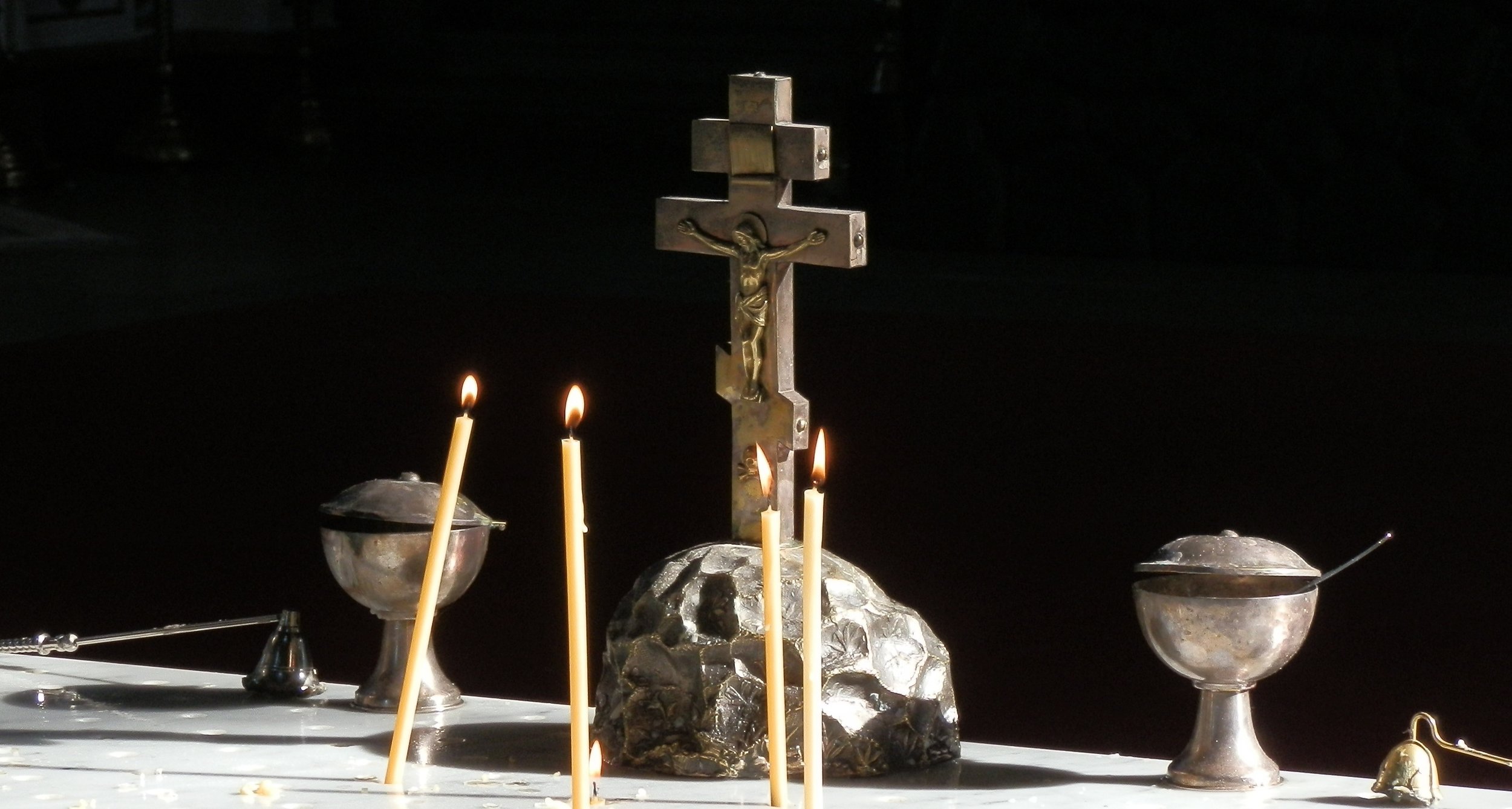Healing Atonement
Ambrose of Milan (340 - 397 AD)
An old clay oil lamp from Nazareth, Israel. Photo credit: Olivia Armstrong.
Messages and Essays on Ambrose of Milan
Slides to a presentation Mako Nagasawa gave to a class at Gordon-Conwell Theological Seminary in February 2024. Here is the English text of the treatise, which Ambrose wrote in 389. See video recording. Ambrose uses King Ahab as a case study of greed when he seized Naboth’s vineyard, in 1 Kings 21. This presentation relates to the Genesis creation story because Ambrose structures it around Genesis 1. He says that God gave all humans a shared dominion over the creation. In Christ, God gives us dominion, in principle, over sin. Covetousness, therefore, is a double problem. It interferes with the shared dominion over the creation, and it causes us to fail in exercising proper Christ-centered dominion over the sin in ourselves. Ambrose shows that Ahab became cruel, like the wild dogs that eventually fed off his dead, unburied body, as in 2 Peter 2:19 - 22. Ambrose also draws upon Matthew 6:19 - 24 because of how moths and rust share in our physical goods whereas God shares in the development of our moral goodness. Ambrose draws as well on Luke 12:13 - 34 because the greedy tear down barns/granaries and build bigger ones, finding more pleasure in the rising price of grain, not its widespread availability. A few slides refer to Ambrose’s understanding of the human being as a human becoming, Jesus’ work of atonement as a medical substitution healing human nature for us and inviting us to share in him, the pressing issue being human desires and not deservingness per se, and hell as the love of God but experienced by those who have become addicted to sin.
The Writings of Ambrose of Milan
Ambrose of Milan, Exposition of the Christian Faith, book 2, paragraphs 93 - 94
Ambrose of Milan, Exposition of the Christian Faith, book 5, paragraphs 117 - 178, 181
Ambrose of Milan, On the Holy Spirit, book 1, chapters 9 - 10, paragraphs 109 - 114
Ambrose of Milan, On Repentance, book 1, chapter 3, paragraphs 11 - 13
Augustine of Hippo, On the Grace of Christ and on Original Sin, book 2, chapter 47 quotes Ambrose against the Novatians: "Hence it is that Paul's flesh is 'a body of death;' even as he says himself, 'Who shall deliver me from the body of this death?' Christ's flesh, however, has condemned sin, which He experienced not by being born, and which by dying He crucified, that in our flesh there might be justification through grace, where previously there was impurity through sin."
The Works of Ambrose in Chronological Order (Fourth Century Christianity website)
More Resources on Ambrose of Milan
The Academy for the Study of Ambrose of Milan (website)
David G. Hunter, Helvidius, Jovinian, and the Virginity of Mary in Late Fourth-Century Rome. Journal of Early Christian Studies 1:1, 47 - 71, 1993 | The Johns Hopkins University Press. Helvidius and Jovinian were fourth century writers who criticized the deployment of Mary to bolster the Christian vocation of celibate monasticism in an unjustifiable way, considering history and theology. Of great interest here is the negative view of sexual intercourse even within marriage. Origen and Ambrose both associate Mary’s virginity at conception as deflecting the sin associated with sexual intercourse from herself and Jesus. This is of great importance in theological anthropology and the distance that church moved from synagogue.
Alister McGrath, Iustitia Dei: A History of the Christian Doctrine of Justification. Cambridge University Press, 4th edition 2020. McGrath refers to Ambrose by way of Augustine on p.48:
“Augustine appeals to the parable of the Good Samaritan (Luke 10), seeing in this image of a wounded and injured person who is entrusted to an innkeeper for restoration to health an imaginative rendering of both the concept of salvation as a process of healing, and the role of the church in this process. While Augustine's allegorical interpretation of the parable probably derives from Ambrose, his use of it is entirely consistent with his own transformative approach to justification as a process of transformation by which sinners are healed and renewed within the community of faith. The idea of Christus medicus -- Christ as the authentic healer of the human soul -- was used extensively by Ambrose: "We have found shelter with the Physician, who has healed our former wounds. We have received the great medicine of His grace, for great medicine takes away great sins.”
“Augustine develops this idea further, arguing that God, in healing humanity through the incarnation, has acted both as the administering physician and administered medicine. Christ is thus the ‘complete physician of our wounds (totus medicus vulnerum nostrorum) who transforms our natures and situations. In a powerful correlation of the doctrine of the incarnation and the image of Christus medicus, Augustine declares that, since we were unable to go to the physician for the healing of our multiple wounds and illnesses, the physician graciously chose to come to us instead. We are healed of our wounds, our infirmities, our unrighteousness, and our sin through the transformative work of Christ within us.”
Sources of Atonement Theology
These resources explore the foundation of “Medical Substitution” as the best understanding of the Bible, and the original understanding of the church. There are also links to books, web articles, etc. from representatives of the three broad Christian traditions.





